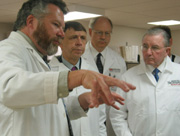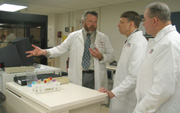 |
Rodney S. Markin, M.D., Ph.D., left, founder and CEO of LAB-InterLink, explains the automated clinical laboratory at NHS to Rear Adm. James Plehal, second from left, while Steve DeBerg, administrative director of the NHS University Hospital clinical laboratory, and Bob Bell, UNeMed vice president, look on. |
A top official from the U.S. Department of Homeland Security visited UNMC on Monday, seeing firsthand a sample of the university’s expertise on bioterrorism preparedness.
U.S. Navy Rear Adm. James Plehal heard from Chancellor Harold M. Maurer, M.D., Lt. Gov. Dave Heineman, and several other state and university officials. UNMC faculty member Steve Hinrichs, M.D., director of the Nebraska Public Health Laboratory and the NU Center for Biosecurity, joined the group via video conference from Richmond, Va. Plehal is the deputy director of the Information Analysis & Infrastructure Protection (IAIP), which is one of five divisions, or “directorates,” of the Department of Homeland Security.
“We were thrilled to have Rear Adm. Plehal on campus,” Dr. Maurer said. “Being on campus really gives these officials a better perspective of our expertise in bioterrorism preparedness, and how excited we are to serve the nation in this area.”
Plehal also witnessed a demonstration of the automated clinical laboratory on the third floor of NHS University, and he toured the Peter Kiewit Institute (PKI) at the University of Nebraska at Omaha. Dave Hinton, Ph.D., dean of the College of Information Science and Technology at UNO, and Blaine Burnham, Ph.D., director of the Nebraska University of Computer Information Assurance, led the informational tour at PKI. Plehal heard much about the work that the state and university have done in several areas of information technology, including coordination and analysis of data, and information security, among others.
“I was really impressed with the energy demonstrated by the individuals that I met with,” Plehal said. “I am amazed at the work being done here.”
The IAIP directorate includes the former National Infrastructure Protection Center and four other government entities. IAIP’s current mission is to merge under one roof the capability to identify and assess current and future threats to the homeland, map those threats against our vulnerabilities, issue timely warnings and take preventive and protective action.
 |
Dr. Markin explains another part of the clinical laboratory to Plehal and Bell. |
Officials have touted UNMC as a potential home for a Bioterrorism Emergency Preparedness Laboratory Center, which would augment the work of the Centers for Disease Control and Prevention (CDC) in Atlanta. In addition to the scientific expertise of the faculty at UNMC and PKI, Omaha has numerous other advantages, including: its location at the center of the country, away from coastal terrorism threats and a less likely location for international terrorism; it is at the bisection point of major transportation lines, both railroad and road vehicle; StratCom is easily accessible; it has needed redundancy in fiber-optic networks and other means of communication.
Plehal is the latest in many national officials who have visited UNMC to learn more about its bioterrorism preparedness expertise. Among those visitors was Department of Homeland Security Secretary Tom Ridge, who came to campus in October 2002.